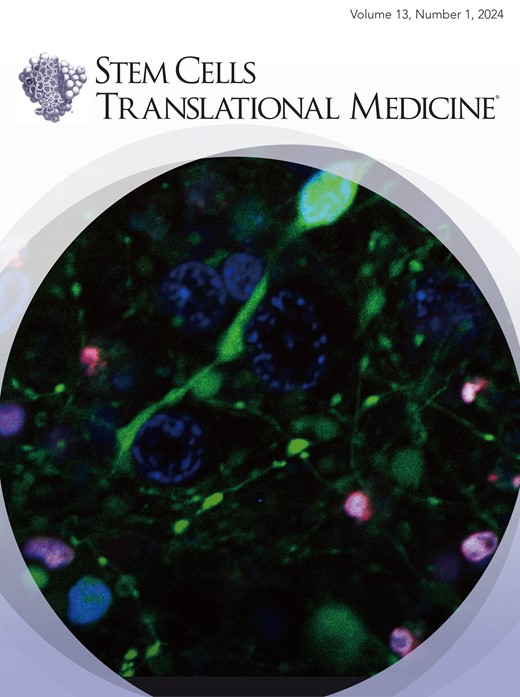解码造心细胞分泌组与心脏修复生物特征的联系。
IF 4.9
2区 医学
Q1 CELL & TISSUE ENGINEERING
引用次数: 0
摘要
尽管心肌输送后的保留时间有限,但以心脏造血为先导的人类干细胞在治疗心力衰竭方面具有持续的益处。为了评估潜在的旁分泌作用,我们通过定向蛋白质组学,并辅以机器学习和系统分析,解码了心脏造血调控的人类间充质基质细胞的分泌组与未调控的人类间充质基质细胞的分泌组。心脏造血使细胞蛋白质输出量翻倍,产生了一种与条件状态截然不同的分泌组。心脏造血改变了 1035 种分泌蛋白的表达,重塑了跨功能类别的分泌组。已解决的心造血差异分泌组富含中胚层发育和心脏祖细胞信号转导过程,通过上调的心血管生成蛋白产生了心血管生成特征。与此同时,心脏造血增强了与细胞因子信号、白细胞迁移和趋化有关的免疫调节蛋白的分泌。网络分析将不同的分泌组整合到一个由1745个分子组成的相互作用组中,该相互作用组具有优先再生过程的特征。在小鼠冠状动脉结扎模型中评估了分泌组对经造血细胞处理的梗死心脏修复特征的贡献。心肌内输送造血细胞改善了衰竭心脏的性能,非定向蛋白质组学揭示了50种对细胞疗法有反应的心肌蛋白质。通路分析将分泌组与心脏蛋白组重塑联系起来,确定了17个心脏造血上调分泌组蛋白直接位于44%细胞疗法反应性心脏蛋白组的上游。基因敲除后,这22种依赖于分泌组的心肌蛋白组合消除了修复特征的指数。因此,在体内,细胞疗法使梗死心脏的分泌依赖性心肌蛋白质组与健康心脏的蛋白质组难以区分。因此,心脏造血的分泌效应改变了人类干细胞分泌组,赋予了再生能力,并上调了细胞疗法介导的分子修复的候选旁分泌效应因子。本文章由计算机程序翻译,如有差异,请以英文原文为准。
Decoded cardiopoietic cell secretome linkage to heart repair biosignature.
Cardiopoiesis-primed human stem cells exert sustained benefit in treating heart failure despite limited retention following myocardial delivery. To assess potential paracrine contribution, the secretome of cardiopoiesis conditioned versus naïve human mesenchymal stromal cells was decoded by directed proteomics augmented with machine learning and systems interrogation. Cardiopoiesis doubled cellular protein output generating a distinct secretome that segregated the conditioned state. Altering the expression of 1035 secreted proteins, cardiopoiesis reshaped the secretome across functional classes. The resolved differential cardiopoietic secretome was enriched in mesoderm development and cardiac progenitor signaling processes, yielding a cardiovasculogenic profile bolstered by upregulated cardiogenic proteins. In tandem, cardiopoiesis enhanced the secretion of immunomodulatory proteins associated with cytokine signaling, leukocyte migration, and chemotaxis. Network analysis integrated the differential secretome within an interactome of 1745 molecules featuring prioritized regenerative processes. Secretome contribution to the repair signature of cardiopoietic cell-treated infarcted hearts was assessed in a murine coronary ligation model. Intramyocardial delivery of cardiopoietic cells improved the performance of failing hearts, with undirected proteomics revealing 50 myocardial proteins responsive to cell therapy. Pathway analysis linked the secretome to cardiac proteome remodeling, pinpointing 17 cardiopoiesis-upregulated secretome proteins directly upstream of 44% of the cell therapy-responsive cardiac proteome. Knockout, in silico, of this 22-protein secretome-dependent myocardial ensemble eliminated indices of the repair signature. Accordingly, in vivo, cell therapy rendered the secretome-dependent myocardial proteome of an infarcted heart indiscernible from healthy counterparts. Thus, the secretagogue effect of cardiopoiesis transforms the human stem cell secretome, endows regenerative competency, and upregulates candidate paracrine effectors of cell therapy-mediated molecular restitution.
求助全文
通过发布文献求助,成功后即可免费获取论文全文。
去求助
来源期刊

Stem Cells Translational Medicine
CELL & TISSUE ENGINEERING-
CiteScore
12.90
自引率
3.30%
发文量
140
审稿时长
6-12 weeks
期刊介绍:
STEM CELLS Translational Medicine is a monthly, peer-reviewed, largely online, open access journal.
STEM CELLS Translational Medicine works to advance the utilization of cells for clinical therapy. By bridging stem cell molecular and biological research and helping speed translations of emerging lab discoveries into clinical trials, STEM CELLS Translational Medicine will help move applications of these critical investigations closer to accepted best patient practices and ultimately improve outcomes.
The journal encourages original research articles and concise reviews describing laboratory investigations of stem cells, including their characterization and manipulation, and the translation of their clinical aspects of from the bench to patient care. STEM CELLS Translational Medicine covers all aspects of translational cell studies, including bench research, first-in-human case studies, and relevant clinical trials.
 求助内容:
求助内容: 应助结果提醒方式:
应助结果提醒方式:


